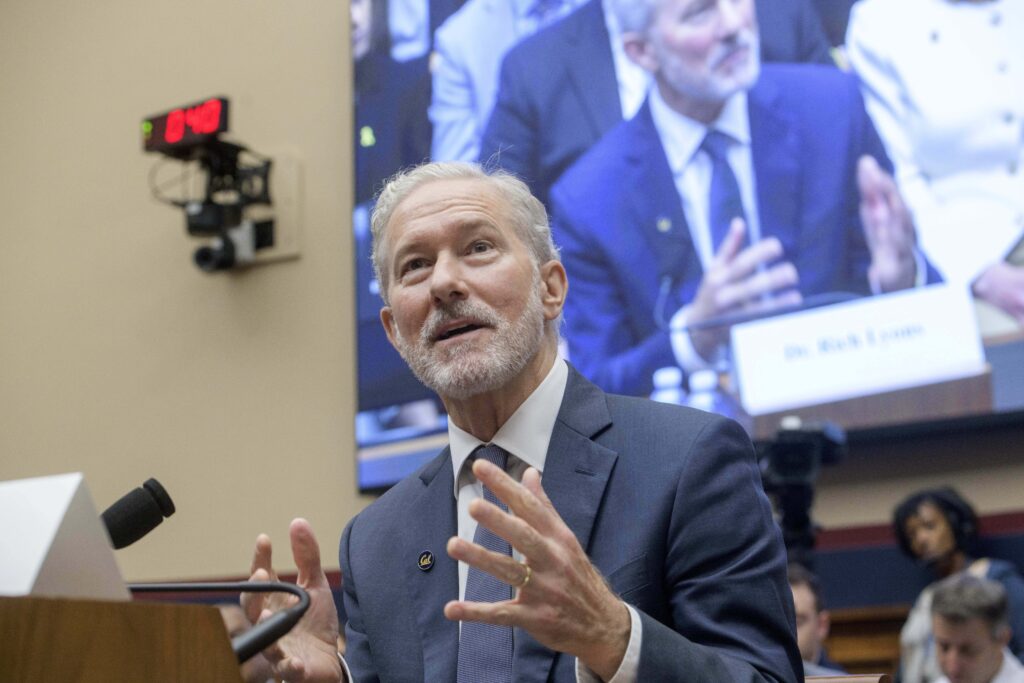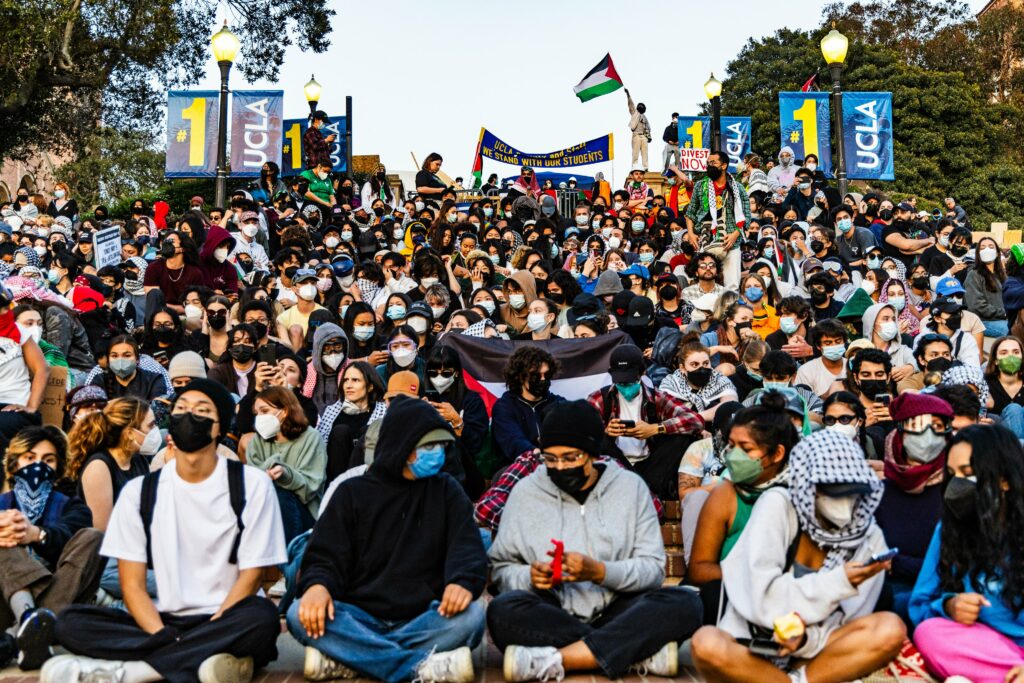
Assemblymember Dawn Addis, D-Morro Bay, explains AB 2918 during an Aug. 5 Senate committee hearing.
Credit: Senate Education Committee
A solution to curb antisemitic content they say is infecting some districts’ ethnic studies courses is eluding Jewish legislators. The legislation they authored has failed to gain traction so far, despite the support of State Superintendent of Public Instruction Tony Thurmond and Gov. Gavin Newsom.
Assemblymembers Rick Zbur, D-Los Angeles, and Dawn Addis, D-Morro Bay, are pledging to return next year with a new version of their bill and a bigger coalition behind it. Last week, they pulled Assembly Bill 2918 from consideration amid sharp opposition from the California Teachers Association and college ethnic studies faculty. And they have yet to make the case to the largely progressive Legislature that some ethnic studies courses are problematic, and that it’s not just a Jewish problem.
The bill would have added levels of public review, additional disclosure and additional anti-bias provisions to 2021 law (Assembly Bill 101) that set a mandate for students to take high school ethnic studies as a graduation requirement, starting in 2030-31. Zbur said that he, Addis and the backers are ready to “really start from scratch, put everything on the table, and try to share something that addresses the problem that we are facing.”
The “problem,” they charge, is anti-Israel content that is bleeding over to antisemitism in the classroom. The primary intent of California’s high school ethnic studies is to focus on the historic struggles and achievements of minority groups within the United States. But a collection of groups, called the Coalition for Liberated Ethnic Studies, led primarily by college ethnic studies faculty, have made the Palestinian conflict with Israel a theme of a high school ethnic studies course. They have characterized Israel as an oppressive settler colonialist nation that compels the liberation of Palestine. Jewish families complain that teaching a biased and one-sided view of the conflict has provoked antisemitic remarks, bullying and antagonism toward Jewish students. The courses also stress the continuing harms of white supremacy and corporate capitalism.
More than two dozen unified school districts, including Santa Ana, San Diego, Hayward, San Diego, Oakland, Castro Valley and Berkeley unified school districts, have signed contracts with consultants affiliated with the “liberated” approach to ethnic studies. The groups include the Liberated Ethnic Studies Model Curriculum Consortium, Community Responsive Education, the Association of Raza Educators, and the Xicanx Institute for Teaching and Organizing.
“Unfortunately, we are witnessing harmful situations where, intentionally or not, some ethnic studies curriculum and instruction is creating classrooms that Jewish students are not experiencing as safe, inclusive, or affirming,” Addis said at an Aug. 5 hearing of a Senate committee.
The clash between the Legislative Jewish Caucus and the authors of liberated ethnic studies instruction predates the adoption of the state’s ethnic studies model curriculum framework in 2021. But the ongoing conflict in Gaza, in which 1,200 Israelis were slaughtered and 40,000-plus Palestinians have perished, has heightened tensions. Since Jan. 1, the Office of Civil Rights in the U.S. Department of Education has opened investigations of Berkeley, Oakland and San Francisco unified districts on charges they have failed to respond properly to incidents of antisemitism.
Several UC and CSU ethnic studies faculty advised or participated in creating the first draft of the state’s ethnic studies model curriculum, which the State Board of Education ordered rewritten in 2019 to present a more balanced perspective on race. The final draft excised the initial draft’s endorsement of the Boycott, Divestment and Sanctions movement against the Israeli government and universities.
Addition of guardrails
At the encouragement of the Legislative Jewish Caucus and Gov. Newsom, Assembly Bill 101 establishing the high school graduation mandate explicitly stated that the Legislature intended for school districts to not use unadopted portions of earlier drafts of the model curriculum.
The law also states that ethnic studies materials and instruction should be appropriate for use with pupils of all races, religions, nationalities and other legally protected student groups and that it “not reflect or promote, directly or indirectly, any bias, bigotry, or discrimination against any person or group of persons.”
California Attorney General Rob Bonta and the Newsom administration have reminded school districts to follow the law’s requirements for “inclusivity, sensitivity, and accuracy.”
“Vendors have begun promoting curriculum to use for ethnic studies courses. We have been advised, however, that some vendors are offering materials that may not meet the requirements of AB 101, particularly the second requirement (not reflecting or promoting any bias, bigotry, or discrimination), an important guardrail highlighted when the bill was signed,” Brooks Allen, executive director of the State Board of Education and an education adviser to Newsom, wrote in a memo to districts a year ago. “Accordingly, before any curriculum or instructional materials for ethnic studies courses are selected, we strongly encourage you to closely scrutinize them to ensure that they meet the above requirements.”
Allen’s guidance does not single out any vendor or group, but the UC Ethnic Studies Faculty Council assumed it was aimed at them. In response, the council denounced the guardrails as censorship. “We vehemently oppose the preemptive restriction of what can be taught, examined, and researched as part of ethnic studies. … In a very real sense, the guardrails are themselves a form of bias, bigotry, and discrimination. California teachers should be able to deliver lessons on important concepts such as settler colonialism, apartheid, and resistance without having to fear censorship or legal action by the state.”
The Legislative Jewish Caucus, however, argues that the “guardrails” and transparency requirements under the law must be more explicit to be effective.
The last version of AB 2918, posted July 3, included compromise language suggested by staff of the Senate Education Committee. Among its key provisions, it called for districts to create a committee to review ethnic studies curriculum and materials prior to adoption. Although the majority would be teachers, it would include parents and guardians and representatives from community organizations “with experience assisting children build cultural awareness and understanding.” The district would notify parents how they could participate in the process or comment on the courses and materials once they are produced.
And, once materials or a curriculum is approved, the school board or superintendent would certify to the California Department of Education that it followed the review process — requirements that do not apply to other academic programs.
Under current law, districts must hold a hearing on a proposed ethnic studies curriculum before adopting it at a second board meeting. But some parents have complained that they were unaware that an ethnic studies course had been adopted, and some boards had placed the curriculum on a “consent” calendar for automatic approval without discussion.
In August 2023, the Washington, D.C.-based Louis Brandeis Center and other legal groups sued Santa Ana Unified school board for violating the Brown Act, the state’s open meeting law, in passing a liberated ethnic studies curriculum without proper notice, and for allowing members in the audience to insult Jewish speakers.
“By failing to intervene in the heckling and harassment of Jewish speakers at its board meeting, the board contributed to creating a hostile environment that prevented Jewish members of the public from fully exercising their right to participate in SAUSD Board meetings as the Brown Act requires,” the lawsuit read.
The bill also would have added another protection to the existing “guardrails” in the current law, that the curriculum “foster respect and acceptance and focus on the experiences of communities of the United States” — as opposed to tensions abroad. The implication is that a lesson on the war in Gaza should incorporate the perspective of Israel and American Jews. And the principle would apply to other minority groups portrayed negatively, he said.
“A lot of people think we are ‘trying to water down the curriculum’ “and steer away from the four primary groups that are the focus of ethnic studies (Blacks, Latinos, Native Americans and Asian Americans), Zbur said at the Aug. 5 Senate hearing. “We’re not. But to the extent there is content that is about or affects other communities, you need to look at how it will be viewed by the community itself.”
A threat to ethnic studies?
Opposition to the bill was strong. In an urgent call to action to ethnic studies supporters at UC Santa Cruz, Christine Hong, professor of critical race and ethnic studies and literature at the university, wrote that AB 2918 would require an extra round of approval and another round of state certification.
“No other K-12 discipline has these requirements — ethnic studies, a field forged by students of color, is specifically being targeted by special political interests,” she wrote. And she charged that undefined community “stakeholders” would be able “to shut down an ethnic studies program if they don’t like what is being taught.”
Seth Bramble, a lobbyist for the California Teachers Association, agreed, saying the bill singled out ethnic studies courses and educators “as the only discipline where we need extra scrutiny and where we need extra red tape to ensure the class is appropriate for all learners.”
“These unnecessary hurdles replicate the very inequality that ethnic studies seek to address, limiting the potential reach and impact of ethnic studies,” he said at the hearing.
Although most of the speakers who identified themselves as Jewish expressed support, Maya Steinhardt, who said she was a Jewish teacher and former Sacramento State student who had spent time at a pro-Palestinian encampment, dissented. “I’m concerned that this bill will result in the same kind of biased education that the authors say they are combating. As the authors stated, marginalized communities should have a voice in how their stories are told. But what happens when different marginalized communities have differing views on the same history? Do you privilege one group’s perception over another?”
The authors and the caucus say that ethnic studies require a different response because it is different. For other subjects — math, English language arts, history, and science — the state has adopted academic standards with a state-led textbook and materials adoption process. For ethnic studies, there is only a voluntary model curriculum framework, leaving it to districts to choose what to teach.
The lack of academic standards, along with a materials review, “makes school districts susceptible to adopting variations of curricula that go beyond the law’s guardrails,” Sen. Josh Becker, D-Menlo Park, and a caucus member, wrote in an email. He said the ethnic studies course at a high school his son attended was “a clear and dramatic violation of the law” on ethnic studies “with obvious factual inaccuracies.”
More time to build support
Zbur and Addis introduced AB 2918 late in the legislative session, leaving too little time to assemble a coalition outside the Legislative Jewish Caucus, Zbur acknowledged. He said he would spend the coming weeks negotiating with education unions, including the CTA, and increasing the support by showing that “these guardrails protect all communities,” not just Jewish Californians.
He said he expects support from Thurmond, who has not participated in negotiations thus far, and Newsom, who committed in his April 2024 Golden State Plan to Counter Antisemitism that he “will work with the Jewish Caucus and Legislature to pursue legislation strengthening the guardrails established by AB 101.”
Along with setting a high school graduation mandate, AB 101 requires that all high schools begin offering an ethnic studies course in 2025-26. In preparation, many school districts will approve courses and materials this year.
AB 2918’s delay could mean the window for affecting that process will close too soon to affect that process in many districts.






